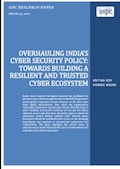Firm on Modernisation: India’s Defence Budget 2021-22
The Union Budget 2021-22, presented to the Parliament on February 01, 2021, earmarked Rs 4,78,196 crore to the Ministry of Defence or some 14 per cent of the central government's budget. Representing an increase of just 1.4 per cent, the increase in the MoD's latest allocation is one of the lowest in recent past. What has caused such a paltry increase in the defence budget? How does it impact the modernisation of the Indian armed forces, which has drawn increasing attention because of the Chinese aggression on India's borders?
